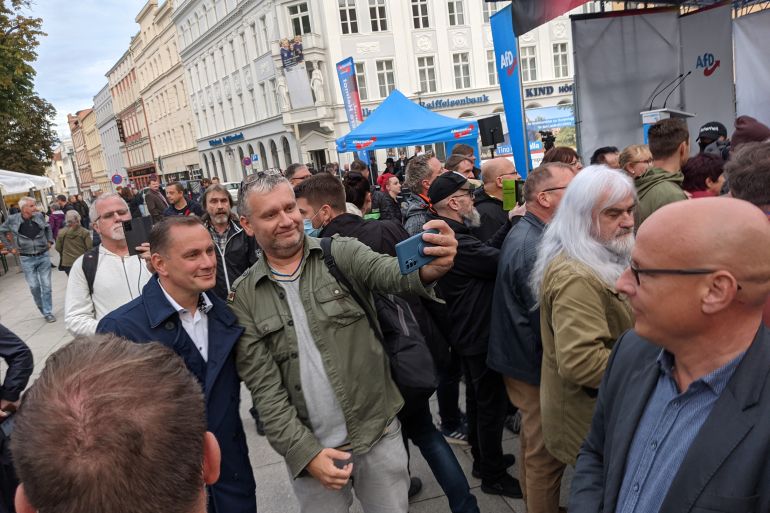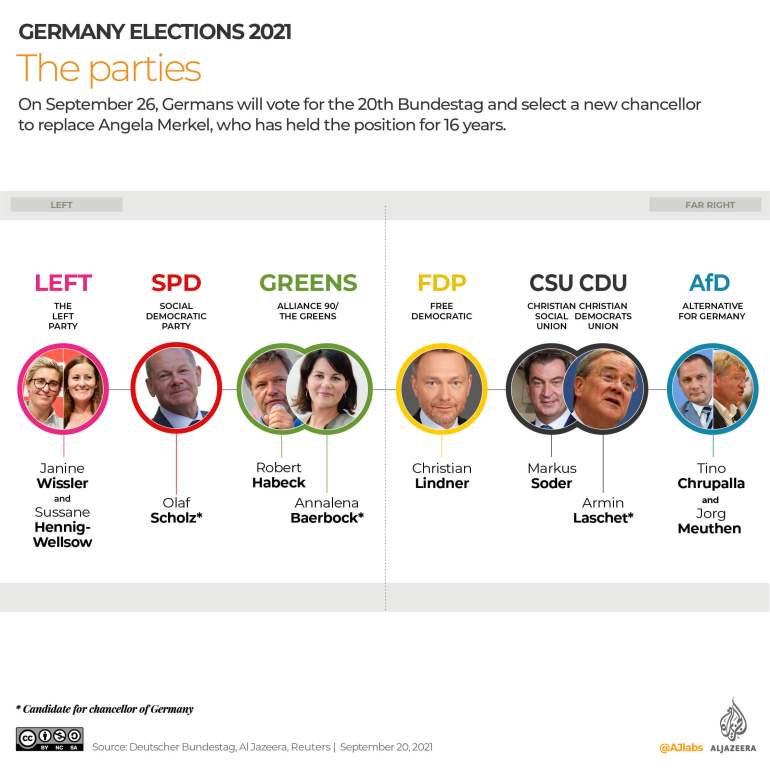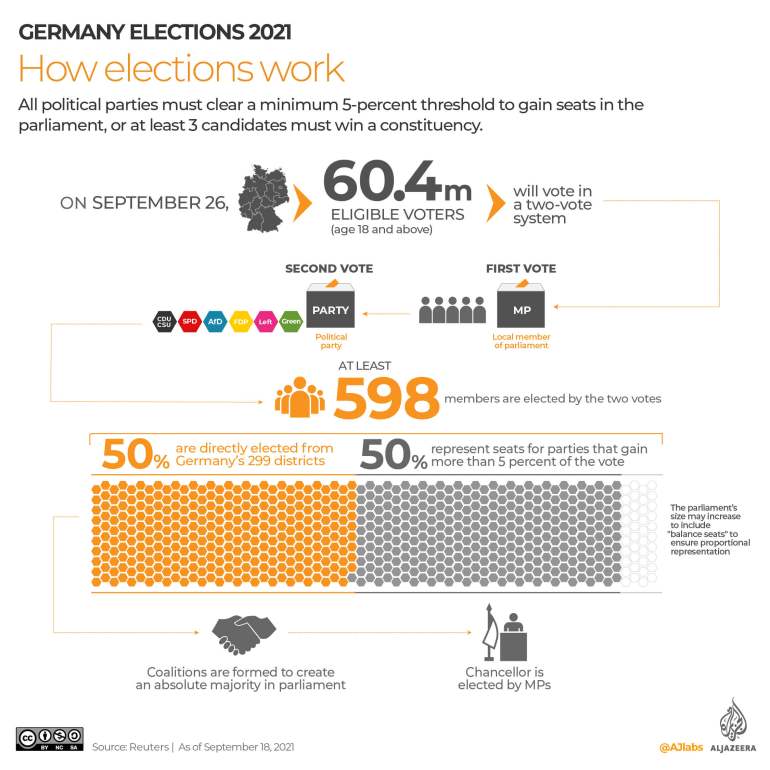Germany elections: In Saxony, the far-right AfD wields power
Hundreds flock to Görlitz town square to hear party leaders rail against the political elite, migrants and COVID vaccines.

Görlitz, Germany – Doreen, a clothes shop saleswoman, is in Görlitz’s town square, which is quickly filling with supporters of the far-right Alternative for Germany (AfD) party.
Around her, a largely grey-haired crowd swells into the hundreds.
Keep reading
list of 4 itemsIn Germany, debate on trade with China grows as Merkel nears exit
Germany’s post-Merkel Middle East policy: What to expect
Infographic: All you need to know about Germany’s elections
A band plays Dire Straits and a placard reads: “We share our pension, but not with the whole world: Solidarity requires borders.”
The event headliners are two of the party’s most prominent faces – parliamentary leader Alice Weidel and co-chair Tino Chrupalla, a tradesman and painter from Görlitz who in 2017 narrowly removed the conservative incumbent to claim the district’s seat in the federal parliament.
“He’s a good man,” Doreen told Al Jazeera. “He says what many are thinking.”
Originally established to oppose the Eurozone, the AfD has carved out a role as Germany’s leading opponent of migrants and asylum seekers, eventually riding the backlash against Chancellor Angela Merkel’s immigration policies into the federal parliament for the first time in 2017.
It took 94 seats, making it the largest opposition party, with much of its support drawn from the states in what was formerly East Germany.
Since then, it has established itself in all state legislatures, where it campaigns against migrants, climate protection, LGBTQ rights, socialism and the European Union.
The AfD has become even more nativist under the growing influence of its eastern branches, where leading figures include Björn Höcke, a hardliner who once called Berlin’s Holocaust memorial a “memorial of shame”.
Germany’s domestic intelligence agency put the party under observation in March due to suspicions it was engaged in right-wing “extremism”, local media reported.

Sidelined for much of the past two years as immigration dropped from voters’ priorities, the AfD was initially caught flat-footed by the coronavirus pandemic, before pivoting sharply against the government’s lockdown measures and advocating the right to refuse vaccination.
The party is polling at about 11 percent nationally, short of the 13 percent it received in 2017.
But an historically weak campaign by Merkel’s Christian Democratic Union (CDU) has created an opening in Saxony, where Görlitz is located, and the party commands its strongest support.
A poll published by Insa last week put the AfD ahead on 26 percent in Saxony, placing them in pole position. It is predicted to significantly increase its share of directly elected representatives across the state, leading in almost every district outside the big cities.
“The difference to the years before is that [Merkel’s] CDU is performing very, very badly these days; especially in the federal election polls. And so suddenly, the AfD is becoming the strongest party,” said Maik Herold, a political scientist at the nearby Technical University of Dresden.

Largely spared from Allied bombing in World War II, Görlitz boasts some of Germany’s most stunning architecture.
The winding cobbled lanes and pastel-fronted homes of “Görliwood” are a popular backdrop to period TV series and film productions, including The Grand Budapest Hotel and Inglourious Basterds.
The town sits on the Polish border, marked by the river Neisse. Since Poland entered the Schengen area in 2008, there have been no border checks, allowing residents to stroll across the bridge to buy cheap cigarettes in zloty.
The AfD has stoked poorly evidenced fears of interlopers – criminals and hundreds of migrant families from Iraq – that it says are slipping undetected into Germany.
After German reunification in 1990, Görlitz has shared the downward trajectory of many towns in the formerly communist east.
State-run factories were privatised and shut down, including a power station that employed 6,000 people. As unemployment rose, younger residents left to find work elsewhere, and the population reduced by a quarter.
With a median age of 53.4, the district of Gorlitz is today one of the oldest anywhere in Europe, according to Eurostat data.
Like the rest of Saxony, it was particularly hard-hit by the pandemic. The state recorded more COVID deaths per head than any other in Germany, and vaccine uptake is the lowest – just 54 percent are fully jabbed, compared with an average of 64 percent.
Nevertheless, residents of Saxony – and even AfD voters – still rate their lives and economic situation favourably, said Herold, but perceive that they are being excluded from greater prosperity in the west.
“The main point is not the real inequalities, but there is the feeling of being discriminated against, which is deeply rooted in people’s minds here.”
Stoking fears about migration, COVID vaccines
After a speech by Weidel decrying what she claimed are attempts by the federal government to introduce mandatory vaccination “through the back door”, Chrupalla took the stage to loud cheers.
Beginning by warning that the Taliban’s takeover of Afghanistan was already driving a new wave of migrants towards Germany, he praised the Danish government for its hard line on immigration, and said Germany should adopt Copenhagen’s stated goal of admitting zero asylum seekers.
“We want to decide for ourselves in Germany who can come and who can stay,” he told the crowd.
He lashed out at other familiar AfD targets too – the conservatives who had abandoned their voters, the government that stymies business with regulations and bureaucracy, and the health officials who scaremonger about COVID-19 and want to vaccinate children without their parents’ consent.
Saxony’s CDU led-government, he claimed, had directed public funding towards the state capital, Dresden, abandoning small towns like Görlitz.
“We are being cheated again, like after 1990,” he said.
Lutz, a construction worker from nearby Zittau, was eager to see Chrupalla speak.
He once supported Social Democrats, later the CDU, and now he only trusts the AfD.
Issues like depopulation, old-age poverty, rising inflation and stagnant wages are being ignored by political elites. The focus on climate is a particular bugbear.
“Climate change is the biggest nonsense there is. Germany can’t save the world … Everyone with a brain knows that.”
Throughout the speeches, jeers and chants came from behind the square, where a smaller, younger, and mask-wearing group staged a counter-protest.

One of the organisers, Caroline Renner, has studied in Görlitz for five years, but originally comes from Brandenburg, also formerly a part of East Germany.
“People are just dissatisfied, and when they are dissatisfied, they look for an outlet and then they look for someone to dump their anger on,” the Green Party activist told Al Jazeera. “The AfD simply used that, and said there is an enemy here, these are the foreigners.”
She hopes to live in Görlitz long term, and does not want it to be defined by the far right.
“We have a great number of engaged people here who are committed to a diverse society. It’s not just brown and blue. It’s not just Nazis.”
However well the AfD performs, it will remain a pariah to other parties, who all refuse to cooperate with it at federal or regional levels.
But the party could yet pull off an upset in Saxony.
“We’ll take another triumphant win [this weekend]. I’m sure of that,” Chrupalla announced from the stage.
“Then we’ll look at their faces again in Dresden and Berlin and they won’t know what to say – and we’ll smirk to ourselves.”
